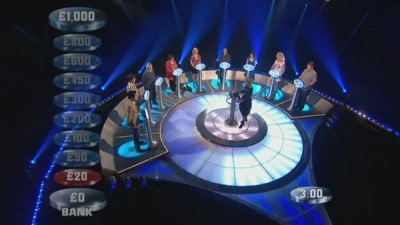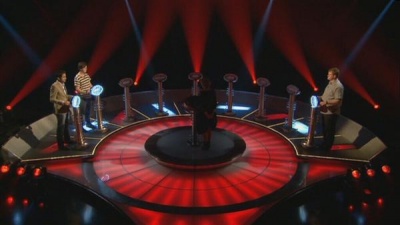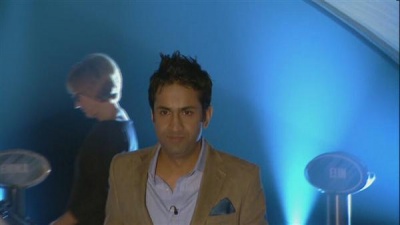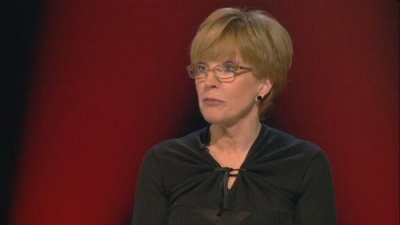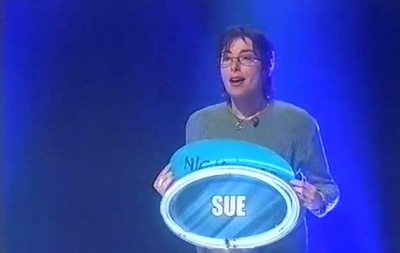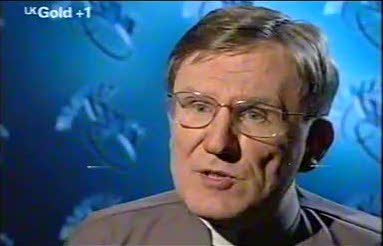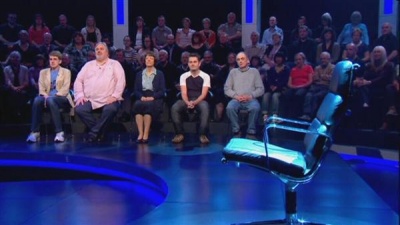Weaver's Week 2012-04-08
Last week | Weaver's Week Index | Next week
"Hitler's quiz" – Phill Jupitus, 20 October 2000.
Contents |
(The) Weakest Link
BBC2, BBC1, and BBC Choice, 14 August 2000 – 31 March 2012
The second weekend of August 2000 was a good time to be a game show fan. Big Brother was brewing up nicely – Caroline became the third guinea-pig to be removed from the cage, and Nick's scheming and machinations would blow up in his face just a few days later. ITV had its great summer hope, The People Versus was the new quiz from the Millionaire team, promising unlimited prizes and asking the Great British Public to set the questions. Over on BBC2, there was also something new, teatime quiz The Weakest Link. In the press pack, host Anne Robinson was quoted, "I'm stricter than most hosts. If a contestant doesn't give me the exact answer that I have, they won't get a point."
Stricter than most hosts? That's one way of putting it. Robinson's character was a complete revolution. Throughout the twentieth century, hosts and quizmasters had come across as being on the contestants' side. Even when asking really difficult questions, or getting them to bend their bodies in anatomically-implausible ways, we always felt as though the host wanted to see a victory.
Robinson gave the impression that she'd lost a bet, and was paying the show's winnings out of her own income. She wanted the contestants to go away actively hating her, and actively hating each other. Robinson inhabited a claustrophobic, dark, intense world, one where nothing short of perfection would stop her from complaining, and even then praise would be grudging.
- "After watching The Weakest Link, I would much rather answer to Goliath than Anne Robinson." – Mrs R. Mitchell, Irvine, writing to the Daily Record, 25 August 2000.
After each round, there's a vote to decide who should leave. "You have won twenty pounds; you could have won £1000. Why aren't you winning more? Who would be better off watching the television rather than appearing on it?"
And then Robinson asks the most difficult question: John, why did you vote for Nick? Whatever answer John gives, he's giving it in front of Nick. "He got two questions wrong and took forever to get them wrong" is one answer, but Robinson wants more. She has the scent of blood in her nostrils, and will rip through skin until someone reveals their true feelings. "He carries the mark of failure! With him on the team, we have no chance of winning more than tuppence! I am stronger, only I can carry off the £3000 prize."
And then, the dismissal. Anne might give the evicted contestant a chance to bite back, she may tolerate some cross-talk between the contenders, but will eventually dismiss them with a curt word. "You are the weakest link. Goodbye." Already, she's forgotten who this non-entity was, turning her back on them to prepare for the next round of questioning. The defeated contender walks off stage, past the presenter's podium, and delivers a brief final piece to camera before vanishing from screen.
- "Phone lines have been jammed with complaints about Anne Robinson over her Dr Crippen-like performance on BBC2's afternoon quiz The Weakest Link. Viewers think Anne is "too nasty" to contestants but the Beeb, while admitting some complaints, say they have received lots of calls praising her." – Sunday Mirror, 27 August 2000.
As is their usual way, the press disliked The Weakest Link. "It's too rude." "Has this woman no manners?" "We'd rather see Vanessa Feltz" – and Celebrity Big Brother still lay in the latter's future. But ratings didn't lie – by September, four million people were tuning in of an evening, and those figures could only be increased by a same-night repeat on BBC Choice, possibly to as much as four million and ten.
Once again, the public reaction was ahead of the press. During a short-lived petrol crisis in September, protesters carried placards suggesting that Tony Blair was the weakest link. After just six weeks on air, the TV Times put out a press release saying that "Anne Robinson is the rudest person on television." We must note that Robinson had other strings to her bow – she'd been presenting consumer advice programme Watchdog since the mid-90s, and viewer winge-a-thon Pointless Views for about as long.
Part of the success of The Weakest Link was that it had some wonderful visual flourishes, and didn't over-use them. Robinson stood at the centre of the stage, with a long flowing cape flapping behind her, and swivelled round to face her next victim. There's a gothic aesthetic, fear and tension and actual vengeance. The lighting – coloured spotlights pointing upwards – never quite worked for us, but the music certainly did: Paul Farrer's score flowed along quietly, gradually increasing in pitch and tempo during the round, before exploding in a discordant burst of noise. It mirrored the show perfectly.
The Weakest Link moved to prime-time BBC1 on Hallowe'en night, bringing back daytime winners to compete for double the prize money. It was shot in front of a studio audience – like the host, encouraged to wear black – and the crowd would join in the insults. And then it went overseas: Germany and France and most famously NBC, who couldn't find a suitably nasty host of their own and imported Anne Robinson. The show's creators, Dr. Fintan Coyle and Cathy Dunning, shared in the riches.
"The possibility of the decidedly un-cruel Weakest Link knocking [Millionaire] off its perch looks remote." – Chris Dunkley, Financial Times, 8 November 2000
And about this time, in the run-up to Christmas, we figured out that it was panto season. And the greatest pantomime of the year was The Weakest Link. At heart, the programme was a general knowledge quiz: a hundred or so questions, delivered though Robinson's ever-so-slightly slow diction and unusual pronunciation – and eventually (though not until late 2001) sorted into approximately ascending order of difficulty. The game was partly human relations, but mostly a test of remaining cool under fire. If you can keep your head while all around are losing theirs, survive the prolix and bamboozling queries designed to trap the unwary, if you can feign a little ignorance and bank a lot, then you could be today's strongest link, my son.
Robinson was joined by announcer Jon Briggs, who gave a brief analysis of what just happened while the contestants wrote down their votes. He'd nominate a strongest link: the player with the most right answers, breaking ties by the amount they'd banked, and then the value of their correct answers. And he'd name a weakest link: the player who had given the most wrong answers, lost the most money from chains, got high-value questions wrong. "The statistics" were malleable, changing the criteria would often change the result, but rarely gave a clearly-wrong outcome.
Celebrity editions began over Christmas 2000, and the likes of Basil Brush and Nick Bateman have been following in the footsteps of Sue Perkins. There had already been some notable contestants – Christopher Hughes was removed after just two rounds for being far too good, and when Rev. David Smith was ousted for similar reasons, he said it was "kick-the-Vicar time." Collectors could buy t-shirts, a really rather rubbish dance single, and black cloaks "as worn on The Weakest Link".
"I know you are keen on summing up policy in six words. Well how about this – you are the weakest link, goodbye." – Tony Blair, 7 December 2000
We always know a politician is floundering when he attacks the opponent as a person, rather than the policies put forward. We always know a politician is desperate when he tries to attach himself to the "cool" thing of the moment, hoping to use a soundbite to appear in touch or in some way relevant. The combination of these two factors, in the debate on the Queen's Speech, was the moment when it was clear. After just sixteen weeks, The Weakest Link had stopped being a cult television show, and was now part of the mainstream.
The Weakest Link provided some useful fodder for psychologists, who could use it as a testing ground for theories. Was there a successful strategy to signal that one was a team player? Indeed there was: bank at £20, £200, or £1000, and draw inferences against people who banked elsewhere. But this contradicted the strategy to maximise winnings, which called for banking at £450 or £20.
And it was a ratings banker for BBC2, going off air only for the most high-profile sports events or news events like the installation of a new Pope. The Link brand was so strong that it allowed other shows to develop around it, but may have overshadowed some general knowledge quizzes so they couldn't succeed. Truth to tell, it could have gone off air at any time after 2006 and we wouldn't have said it was going too soon, but nor did it ever obviously pass its ask-by date. Link transferred to BBC1 in early 2008, replacing the Australian soap Neighbours. There it remained, making about 120 new episodes per year. Production moved to Glasgow in 2009, not that viewers will have noticed the difference.
The Weakest Link continued to make civilian episodes right up to the end, which is more than Millionaire did. The daytime show didn't change its format, its rules, or even its prize structure, though there was some experimentation with the primetime edition. When Anne Robinson told the world last Easter that she would leave the show, the BBC decided not to replace her. This was the right decision: it's impossible to replace such a character. Just ask Ed Tudor-Pole. The other stars of this tale have done well: Jon Briggs is now the voice of the Pearphone, Christopher Hughes is an Egghead, Vanessa Feltz went on to GLR, William Hague is foreign secretary, and Sue Perkins lives in Cornwall and remains Sue Perkins, so wins.
- "Who couldn't tell their elbow from another body part?"
History won't remember the direct copycat shows – Dog Eat Dog, Shafted, King of the Castle all fell off air in a year or two. It will remember Anne as the first host to really bait the contenders, who was always working against them, scolding and chiding them. There's just a touch of the same meanness in its teatime successor The Chase, where the resident quiz deities engage in psychological warfare against their opposition.
And we will remember The Weakest Link most of all for people who failed the test of remaining cool under fire. One of the concluding episodes was from people who had given embarrassing answers. We heard:
- Q: Someone who is embarrassed is said to turn the colour of which vegetable: a cabbage or a beetroot?
- Contestant: Cabbage.
And then this little gem.
- Q: In spelling, the words "gnaw" and "gnash", meaning to nibble and to grind one's teeth, both begin with which letter of the alphabet?
- Contestant: Er, could you repeat the question?
- Q: In spelling, the words "gnaw" and "gnash", meaning to nibble and to grind one's teeth, both begin with which letter of the alphabet?
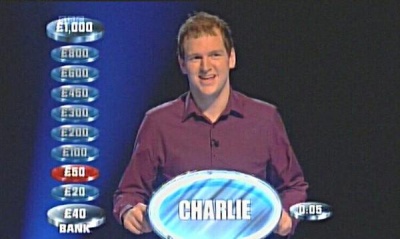 Contestant gets that warm glow of someone who knows the answer and will be able to leave £50 to be banked right before time expires, and smiles in a spectacularly broad grin.
Contestant gets that warm glow of someone who knows the answer and will be able to leave £50 to be banked right before time expires, and smiles in a spectacularly broad grin.
- Contestant: N
- Anne: G.
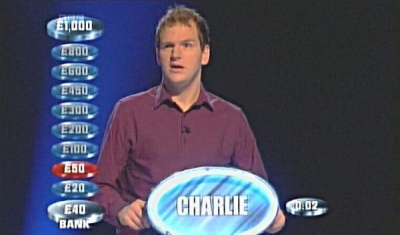 Contestant's face falls, and we have to call up everyone we know in Australia lest they be hit by his jaw descending through the planet.
Contestant's face falls, and we have to call up everyone we know in Australia lest they be hit by his jaw descending through the planet.
You have been reading about The Weakest Link. Goodbye.
Mastermind
Second Round, Match 3
This show aired at 9pm on Friday in Scotland, 8pm elsewhere.
Jonathan Perry is first up tonight, with the Life and Times of Thomas Wolsey (c.1475 - 1530). A graduate of Magdalen Oxford, Wolsey became Archbishop of York and Lord Chancellor, effectively Henry VIII's deputy king. He founded Christ Church College at Oxford and acquired Hampton Court, but was unable to secure an annulment of Henry's marriage to Catherine of Aragon. Trumped-up charges of treason led to his execution. A promising start soon gets bogged down, and in 90 second rounds, there's no room to recover. 4 (2). Read more: John Schofield's biography*.
Ken Owen has the Apostle Peter in the New Testament (c. 1 — c. 64). The son of John of Bethesda, Peter was a fisherman until he was inspired to follow the charismatic religious preacher Jesus of Nazareth, becoming a close friend and confidant. He played a key part in the Easter story, denying knowledge of Jesus. Afterwards, Peter travelled to Antioch and later to Rome, where he became the inaugural Pope. Sound the Perfect Round klaxon! 15 (0).
Mary Bucknall is answering questions on the Heraldry of Britain. Created as a symbol to distinguish messengers in a pitched battle, heraldry encompasses shields, banners, helmets, and non-combat clothing. Heraldry has a language all of its own, "blazon" is mediaeval French in modern pronunciation. 10 (1) is the score. Shield more: the basics of heraldry*.
Next up is Gary Grant, discussing the History of the Monaco Grand Prix (est 1929). A motor race around the principality of Monaco, full of tight corners, short bursts of speed, breaking, and lots and lots of turning. The race has a rich heritage, and is an extreme test of driver ability – it's possible for cars to end up driving headlong into the Med. Perhaps a little lucky to take a question on the buzzer, this contender races to 12 (0). Vroom for more: DVD up to 2008*.
John Beynon is our final contender, with Catherine the Great (1729-96). The empress of Russia, after her marriage to Peter III, Catherine opened up Russia to Enlightenment ideas, allowing St Petersburg to become a cultural centre. She patronised Russian writers and artists, and secured prominence for the University of Moscow. A very creditable score of 13 (0). Rule more: Simon Dixon's biography*.
After the first round, two contenders don't look to be in a position to win. Jonathan Perry qualified with the Life and Work of Mori Ogai on 3 February. He progresses to a "very respectable" (host's opinion, not ours) 16 (4). Mary Bucknall got here on 2 March, taking Queen Victoria's Family, and she extends her score to 13 (8).
Gary Grant won on 10 February with Seven Wonders of the Ancient World, and – as we've picked up a reputation for commenting on Dr. Grant's choice of shirts – we must note he's wearing a very calming dark (purple, we think) t-shirt with white shoulders and sleeves. As in the first round, he snaps out the answers, not wasting a syllable or a second. For instance, he refers to the television chef as "Worral-Thompson", omitting the chap's given name. The final score after a near-perfect round is 28 (0).
Seeing as how we've had recaps of the first round, and chatty walks to the chair, we don't think a play-off is looming. John Benyon got here on 25 November last year, when he took The Cathars and not (as the pre-show publicity said) The Russian Revolution. This contender is a little slower to deliver his answers, and we have a suspicion that he leads the host to deliver his questions a little more slowly. Not that this matters: the final score is 26 (1).
So Ken Owen needs 14 to win. He qualified from the 23 March double-header, two weeks and five programmes ago, taking the Roy Grace novels of Peter James. Though it's a wrong answer, this contender remembers the milky drink posset; we thought this fatty concoction was only ever made by our granny nursing sick grandchildren. The round needs a little TLC, finishing as it does on 22 (0).
Which means that Gary Grant is into the final, whenever that might be.
This Week And Next
Can we ask a favour of someone who's got Jon Briggs narrating their Pearphone? Ask him, "Who do you think is the weakest link?" and tell us what happens. We have literally no idea if the response will be interesting. If there's ever a day for discovering Easter eggs, this is it.
A quiet report from OFCOM this week. Big Brother's Bit on the Side on 24 January has been cleared of promoting drug use. A similar complaint was made against an edition of Tom and Jerry. The Grate British Public, there.
Two more years of Big Brother on Channel 5, and we really hope they can now take a bit of a risk and not cast a houseful of twentysomethings with shoe sizes larger than their vocabularies.
Who Wants to be a Millionaire began a new series this week, with some celebrity contestants. Please let the clock be a thing of the past: it only ever served to annoy us.
Ratings in the week to 25 March, and the most-viewed game show was Britain's Got Talent. It may have fallen behind The Voice on the night, but edged ahead on catch-up viewing, by 9.9m to 9.45m. Dancing on Ice finished its series with 7m viewers, behind the opening The Apprentice on 7.6m. Take Me Out had 4.7m, In It to Win It 4.25m, and Family Fortunes 3.55m. University Challenge ended its series with 3.1m viewers.
Well done to The Chase, which took advantage of Pointless's day off on Friday to record 2.6m viewers. That's only 220,000 below the network premier of Avatar on Channel 4. Celebrity Juice had 2.1m viewers this week, Four Rooms came back with 1.55m – lest we forget, it really struggled for viewers last year – and Breakaway scored 1.4m. That's two Only Connects, the celebrity edition had 705,000 viewers, just behind Britain's Got More Talent (740,000). The final Sport Relief Does Glee Club brought 400,000 to the CBBC channel, and some to the BBC1 simulcast. And well done to Fort Boyard Ultimate Challenge, which makes the top ten of a channel. The channel in question is ITV+1, where it had 49,000 viewers.
Easter Sunday is marked by a Des O'Connor special on ITV (7.30), and Jimmy Carr popping up on Very Minor Celebrity Deal or No Deal (C4, 8pm). New cookery shows this week: The Great British Taste Test (ITV, 4pm weekdays) appears gamey, Great British Menu (BBC2, 7.30 weekdays), and Celebrity Come Dine With Me Ireland (TV3, 9pm). Friday's got BBC Young Musician of the Year (BBC4, 7.30), Would I Lie to You? (BBC1, 8.30), and Have I Got News for You (BBC1, 9pm).
Links marked with a * help support the UKGameshows servers.
To have Weaver's Week emailed to you on publication day, receive our exclusive TV roundup of the game shows in the week ahead, and chat to other ukgameshows.com readers, sign up to our Yahoo! Group.

